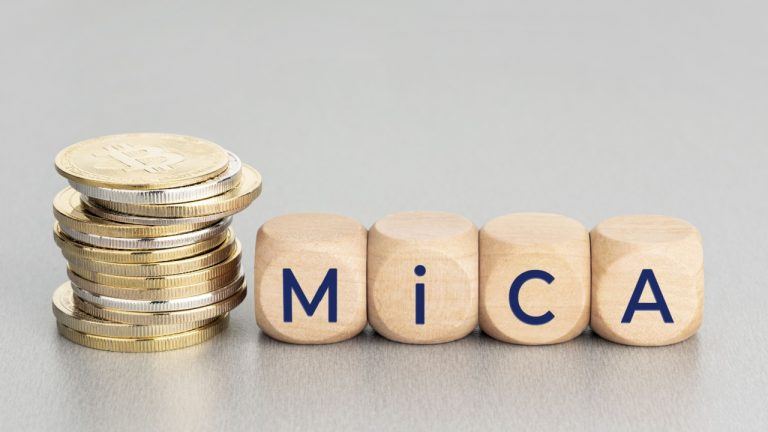
The crypto exchange OKX has decided to “temporarily suspend” its decentralized exchange (DEX) aggregator after consulting with regulators. Traders use data from DEX aggregators to find the best-priced trades across various decentralized exchanges. OKX’s aggregator has recently come under scrutiny. Last month, hackers stole a staggering $1.4 billion worth of Ethereum (ETH) and Lido Staked […]
The post OKX Suspends Decentralized Exchange Operations After Consulting With Regulators To Combat Financial Crime appeared first on The Daily Hodl.
 Trading and investing platform Etoro announced that its EU subsidiary, Etoro (Europe) Ltd, has been granted a permit by the Cyprus Securities Exchange Commission (CySEC) to provide crypto services across the European Union under the Markets in Crypto-Assets Regulation (MiCA). Avi Sela, Chief Operating Officer – Regulation at Etoro, emphasized the importance of regulation in […]
Trading and investing platform Etoro announced that its EU subsidiary, Etoro (Europe) Ltd, has been granted a permit by the Cyprus Securities Exchange Commission (CySEC) to provide crypto services across the European Union under the Markets in Crypto-Assets Regulation (MiCA). Avi Sela, Chief Operating Officer – Regulation at Etoro, emphasized the importance of regulation in […] The EU’s MiCA regulations, which took effect for stablecoins, have led some exchanges to delist Tether’s USDT. However, some experts argue that the new rules will ultimately benefit both stablecoin issuers and users. USDT Delisting Could Lead to Market Disorder With Europe’s stablecoin regime under its Markets in Crypto-Assets (MiCA) regulations now in full effect, […]
The EU’s MiCA regulations, which took effect for stablecoins, have led some exchanges to delist Tether’s USDT. However, some experts argue that the new rules will ultimately benefit both stablecoin issuers and users. USDT Delisting Could Lead to Market Disorder With Europe’s stablecoin regime under its Markets in Crypto-Assets (MiCA) regulations now in full effect, […]

Dec. 30 marked the end of the implementation phase of the Markets in Crypto-Assets framework, as authorities can enforce rules on certain crypto service providers operating in the EU.
MoonPay reported receiving approval to operate as a licensed crypto business in the Netherlands under the European Union’s Markets in Crypto-Assets (MiCA) bill.
In a Dec. 30 notice, MoonPay said the Dutch Authority for the Financial Markets had issued the crypto firm a license in accordance with MiCA regulations. The regulatory framework, first adopted in 2023, was fully enforceable for crypto asset service providers operating in the EU as of Dec. 30.
MiCA approval. Source: MoonPay

While MiCA’s implementation phase is ending on Dec. 30, 2024, there is also a transitional 18-month phase in MiCA’s total 36-month timeline.
The European Union’s cryptocurrency regulations are set to take full effect in just a matter of days, but there’s still a significant amount of uncertainty on Tether’s USDt stablecoin.
United States crypto exchange Coinbase delisted Tether’s USDt (USDT) in mid-December, citing compliance with the EU’s Markets in Crypto-Assets Regulation (MiCA).
After Coinbase’s USDT delisting, the stablecoin has continued trading across the EU, with many exchanges apparently awaiting more clarity from European authorities on USDT’s compliance with MiCA.
 Seizing Russia’s frozen assets risks catastrophic fallout, including collapsing trust in global financial systems, destabilizing the euro, and sparking severe retaliatory measures. Confiscating Russia’s Assets Could Backfire Catastrophically, Euroclear Cautions EU Euroclear Ltd., the Belgian clearinghouse responsible for holding the bulk of Russia’s frozen central bank assets, has raised significant concerns about the risks and […]
Seizing Russia’s frozen assets risks catastrophic fallout, including collapsing trust in global financial systems, destabilizing the euro, and sparking severe retaliatory measures. Confiscating Russia’s Assets Could Backfire Catastrophically, Euroclear Cautions EU Euroclear Ltd., the Belgian clearinghouse responsible for holding the bulk of Russia’s frozen central bank assets, has raised significant concerns about the risks and […] European Union banking regulations have provided a significant competitive advantage for crypto firms compared to the challenges faced by their U.S. counterparts, according to an analysis by Patrick Hansen, senior director of EU strategy and policy at Circle. Circle Exec: Regulatory Clarity Helps Europe Surpass U.S. in Crypto-Friendly Banks According to Hansen’s report, he highlights […]
European Union banking regulations have provided a significant competitive advantage for crypto firms compared to the challenges faced by their U.S. counterparts, according to an analysis by Patrick Hansen, senior director of EU strategy and policy at Circle. Circle Exec: Regulatory Clarity Helps Europe Surpass U.S. in Crypto-Friendly Banks According to Hansen’s report, he highlights […]

Some Coinbase users are airing frustrations at the region’s MiCA laws, which are forcing the exchange to stop offering yields on USDC in the European Economic Area.
Coinbase users in Europe shared frustrations over the region’s crypto regulations after the exchange said it is ending its yield offering on the dollar-pegged stablecoin USD Coin (USDC) for some users.
In a Nov. 28 email that multiple recipients posted on X, Coinbase said due to the European Union’s Markets in Crypto-Assets (MiCA) laws for stablecoins, it “will be sunsetting the USDC rewards program” on Dec. 1.
The change will affect customers in the European Economic Area (EEA), a 30-nation bloc that includes all 27 EU member states along with Iceland, Norway and Liechtenstein. The email said those eligible will still accrue rewards for the next two days until Nov. 30.

Norges Bank backs the EU’s MiCA regulation while considering a CBDC to enhance cross-border payments and support financial stability in Norway.
Norges Bank, Norway’s central bank, has endorsed the European Union’s Markets in Crypto-Assets Regulation (MiCA) as the country evaluates the potential adoption of a central bank digital currency (CBDC).
Kjetil Watne, project director for Norges Bank’s CBDC project, said in an interview with Cointelegraph that Norway, as a member of the European Economic Area (EEA), welcomes MiCA’s framework. However, he noted that the bank is still considering “whether additional regulations are necessary to promote financial stability.”
Watne explained that Norges Bank has “not yet decided” if it will issue a CBDC and is assessing how to “mitigate regulatory gaps related to decentralized finance.”

The Dutch government wants to align its data collection rules for crypto service providers with the rest of the EU, saying it would “create more transparency.”
The Dutch government has asked for public input on proposed laws that would require crypto service providers, such as exchanges, to collect and share user data with the local tax authority — aligning with European Union rules.
“The aim of the bill is to create more transparency about the ownership of cryptocurrencies, which can prevent tax avoidance and evasion,” the Netherlands Ministry of Finance said in an Oct. 24 press release.
It added “nothing will change” for crypto owners under the proposed rules as they’re already required to file a tax return of their holdings to the country’s tax authority, the Belastingdienst.